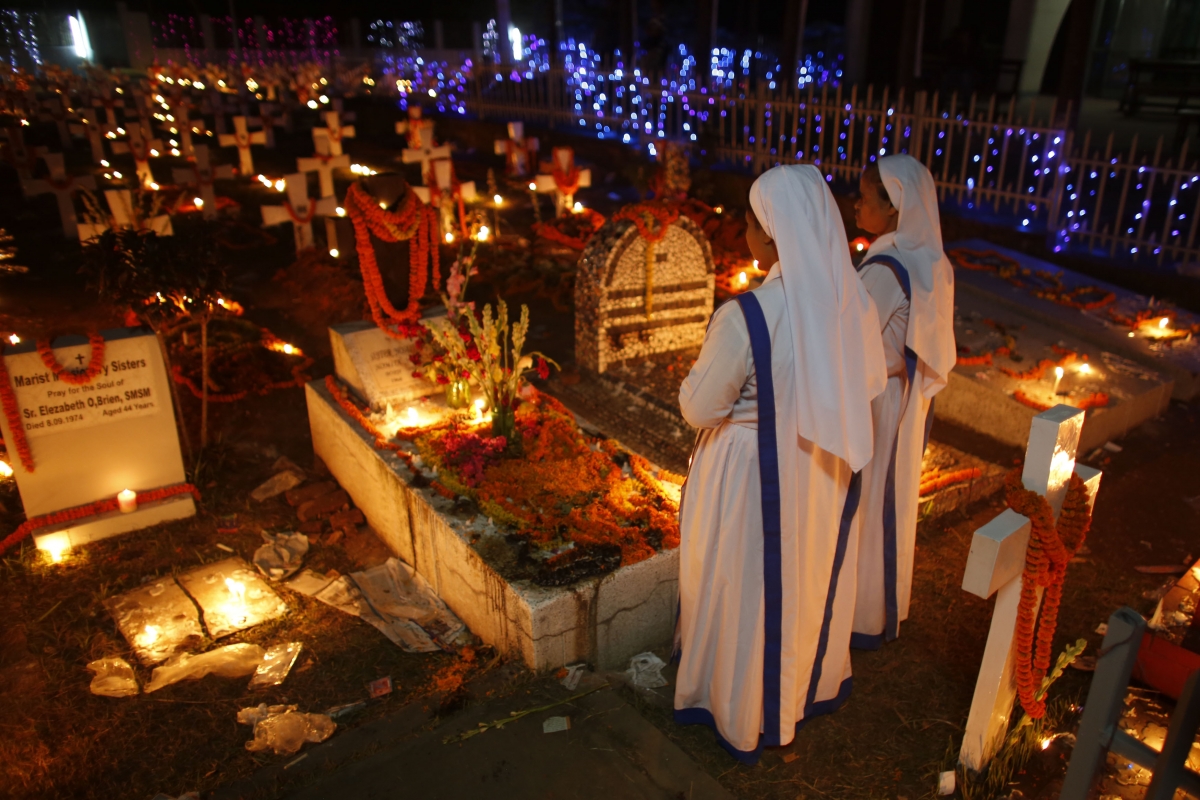"ALL SOULS OCTAVE"

ROMAN CATHOLICS WORLDWIDE PRAYING IN CEMETERIES TO FREE SOULS FROM "PURGATORY" NOVEMBER 1-8
BY HEATHER CLARK
SEE: https://christiannews.net/2018/11/05/roman-catholics-worldwide-praying-in-cemeteries-to-free-souls-from-purgatory-november-1-8/;
republished below in full unedited for informational, educational and research purposes:
As has been the custom for the past 50 years, Roman Catholics
worldwide who pray at a cemetery between Nov. 1-8—and follow other
requirements—are being offered a plenary indulgence to free their loved
one from Purgatory and send their soul to Heaven. The practice has been
said to be unbiblical for a number of reasons.“Purgatory is a travesty on the justice of God and a disgraceful fabrication that robs Christ Jesus of His glory and honor,” Mike Gendron of Proclaiming the Gospel Ministries in Plano, Texas told Christian News Network. “He alone satisfied divine justice, once and for all, by the perfect and finished sacrifice of Himself.”
“The fatal deception of Purgatory blinds Catholics from the glorious gospel of grace,” he said. “It is one of Satan’s many lies that keep his captives from knowing and trusting the sufficiency of Jesus Christ. It is Christ alone who will present us ‘faultless before the presence of His glory’ (Jude 24).”
THE ‘ALL SOULS OCTAVE’
Nov. 1 marked All Saints Day in the Roman Catholic Church, followed by All Souls Day, which began an octave in which adherents of the religion are offered—under certain requirements—a plenary, or complete, indulgence for a deceased loved one or friend. On all other days of the year, the indulgence is only partial.
While indulgences were especially common during the days of Reformer Martin Luther (1483-1546), who strongly rebuked the practice, the November offering is a more recent declaration, issued by the Vatican under the leadership of Paul VI on June 29, 1968.
“An indulgence, applicable only to the souls in Purgatory, is granted to the faithful who devoutly visit a cemetery and pray, even if only mentally, for the departed. The indulgence is partial on any day except from the 1st to the 8th of November; on those days it is plenary,” the “Regulations on Indulgences” reads.
According to the Catechism of the Catholic Church and other Catholic writings, Roman Catholics believe that there are two types of sin: grave sins, or willful violations of the law of God that send one to Hell, and venial sins, those that are more minor and would not jeopardize a person’s salvation.
Catholic teachings also state that while a person may be forgiven of the guilt of sin through Christ’s sacrifice, a temporal punishment for that sin still remains. The person therefore must either do penance to purge themselves on Earth or be purged in a temporary suffering in the hereafter since Heaven can only accept that which is perfectly pure.
“The whole penitential system of the Church testifies that the voluntary assumption of penitential works has always been part of true repentance, and … God does not always remit the whole punishment due to sin together with the guilt. God requires satisfaction, and will punish sin, and this doctrine involves as its necessary consequence a belief that the sinner failing to do penance in this life may be punished in another world, and so not be cast off eternally from God,” the Catholic Encyclopedia outlines.
The doctrine was stated to have been solidified during the Councils of Florence (1439) and Trent (1545-1563), and Catholics further point to the apocryphal book of 2 Maccabees 12, which states, “It is therefore a holy and wholesome thought to pray for the dead, that they may be loosed from sins.”
Therefore, to assist those seeking to have their sins atoned for in this life, or to stand in the gap on behalf of the dead, the Catholic Catechism outlines that Roman Catholic leadership “by virtue of the power of binding and loosing granted her by Christ Jesus” offers indulgences as a means of intervention “in favor of individual Christians and opens for them the treasury of the merits of Christ and the saints to obtain from the Father of mercies the remission of the temporal punishments due for their sins.”
Each November since 1968, the Vatican has offered the living the stated opportunity to obtain plenary indulgences for the dead, so that they might be completely freed from Purgatory and go to Heaven.
One plenary indulgence per day can be obtained during the eight-day period, and to obtain the indulgence, one must visit the cemetery to pray for the departed, receive communion, go to confession, and pray for the pope, with the minimum being the recitation of the Our Father and the Hail Mary. Other rituals may also be employed.
“The more we do for them (the dead) the more powerful their intercession becomes for us, both in purgatory and before the throne of God,” Susan Tassone, author of “The Way of the Cross for the Holy Souls in Purgatory,” told the National Catholic Register in an article published on Nov. 2 entitled “Praying for the Dead: Catholic Liturgies and Practices.”
IS IT BIBLICAL?

He said that when his own father passed away, friends even purchased mass cards so that prayers would be said for him following his death.
“When my own dear dad passed away as a devout Catholic of 79 years, I was amazed at the hundreds of mass cards purchased for him by well-meaning friends. We have heard of other Catholics who have willed their entire estates to their religion so that perpetual masses could be offered for them after they die,” Gendron recalled. “It is no wonder that the Catholic religion has become the richest institution in the world. The buying and selling of God’s grace has been a very lucrative business for the Vatican.”
He said that when the concept of purgatory is compared to Scripture, it does not add up.
“God’s word leaves absolutely no possibility for sin to be purged away by anything other than the blood of Jesus Christ,” Gendron declared. “The Apostle John penned these words with irrefutable clarity: ‘The blood of Jesus His Son cleanses us from all sin’ and ‘all unrighteousness’ (1 John 1:7, 9). John did not say ‘some’ sins or ‘most’ sins, but all sins! This soundly rebukes the need for a sin-purging fire.”
He outlined that those who put their faith in Christ are completely freed not just from the guilt of sin, but also the penalty of it.
“God’s word also declares, ‘All things are cleansed with blood, and without shedding of blood there is no forgiveness’ (Hebrews 9:22). When Jesus ‘made purification of sins, He sat down at the right hand of the Majesty on high’ (Hebrews 1:3),” he noted. “Those who desire to have their sins purged need to trust a person, not a place. The blood of Christ is the only cleansing agent for sin! Those who come to the cross of Christ must come with empty hands of faith, bringing nothing but their sins.”
Gendron, a former Roman Catholic for over 30 years who now encourages Catholics to think biblically, further pointed to Scripture’s teaching that when believers leave their body, they are “present with the Lord,” and therefore not in an in-between state.
“Every blood-bought believer is instantly present with their Redeemer at the moment of death. To be ‘absent from the body’ is to be ‘at home with the Lord’ (2 Corinthians 5:6–8),” he said. “Catholics who believe in Purgatory need to be asked: ‘Who is in charge of releasing souls from the purging fire?’ It cannot be God because of His promise to believers. ‘Their sins and iniquities I will remember no more’ (Hebrews 10:17). After conversion, God no longer counts sins against His children (2 Corinthians 5:19).”
He urged those who are involved in Roman Catholicism to compare tradition to Scripture.
“The apostle Paul warned people about this when he wrote, ‘See to it that no one takes you captive through hollow and deceptive philosophy, which depends on human tradition and the basic principles of this world rather than on Christ’ (Colossians 2:8),” Gendron noted. “Jesus strongly rebuked the Jewish religious leaders of His day for nullifying the word of God with their traditions. He said, ‘They worship Me in vain; their teachings are but rules taught by men. You have let go of the commands of God and are holding on to the traditions of men.'”
“We must test every man’s teaching and traditions by examining them through the lens of Scripture, which is the supreme authority for faith (Acts 17:11),” he said. “God has revealed His truth through His written word, not the traditions of men. We must trust and obey the Sovereign Lord, for our destiny is in His hands, not in the hands of the Catholic clergy.”
CATHOLIC DOCTRINE: "THE BEGINNING & THE END" WITHOUT THE SAVING GRACE OF JESUS CHRIST
Bishop Hoeller's homily for the Sunday within the Octave of All Souls' Day. Recorded on November 5, 2017.
"MAKING OUR TRANSITION FROM LIFE TO LIFE HEREAFTER "SMOOTH":